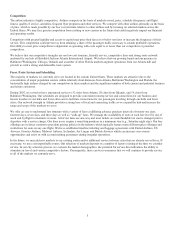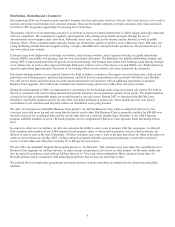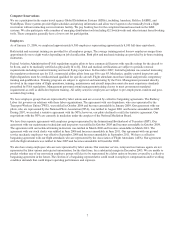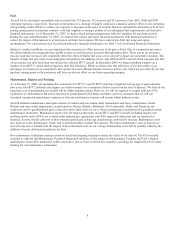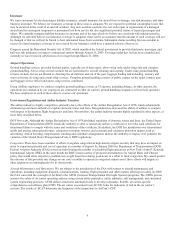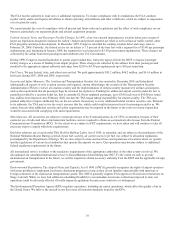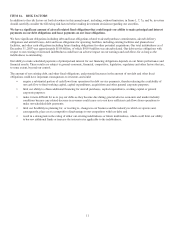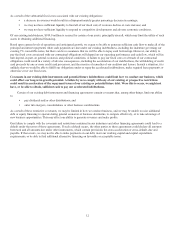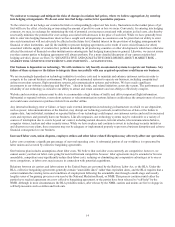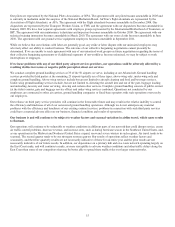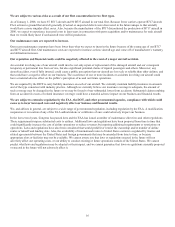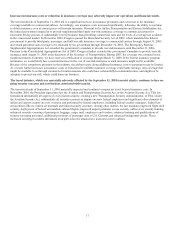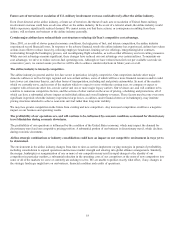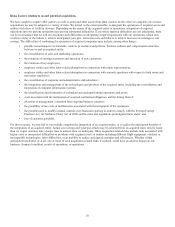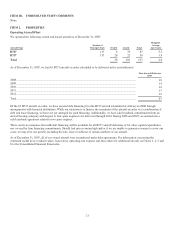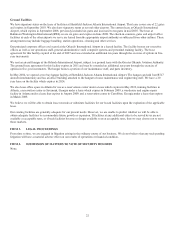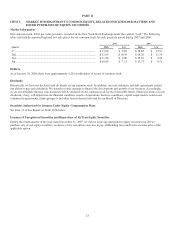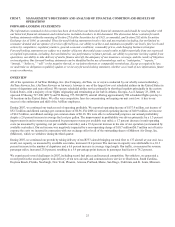Airtran 2007 Annual Report Download - page 21
Download and view the complete annual report
Please find page 21 of the 2007 Airtran annual report below. You can navigate through the pages in the report by either clicking on the pages listed below, or by using the keyword search tool below to find specific information within the annual report.
15
Our pilots are represented by the National Pilots Association, or NPA. The agreement with our pilots became amendable in 2005 and
is currently in mediation under the auspices of the National Mediation Board. AirTran’s flight attendants are represented by the
Association of Flight Attendants, or AFA. The agreement with the flight attendants becomes amendable in December 2008. Our
dispatchers are represented by the Transport Workers Union, or TWU and the agreement with our dispatchers becomes amendable in
January 2009. We have four separate agreements with employee groups represented by the International Brotherhood of Teamsters, or
IBT. The agreement with our maintenance technicians and inspectors becomes amendable in October 2009. The agreement with our
technical training instructors becomes amendable in March 2010. The agreement with our stores clerks becomes amendable in June
2010. The agreement with our ground service equipment employees becomes amendable in September 2011.
While we believe that our relations with labor are generally good, any strike or labor dispute with our unionized employees may
adversely affect our ability to conduct business. The outcome of our collective bargaining negotiations cannot presently be
determined. If we are unable to reach agreement with any of our unionized work groups on future negotiations regarding the terms of
their collective bargaining agreements or if additional segments of our workforce become unionized, we may be subject to work
interruptions or stoppages.
If we incur problems with any of our third party airport services providers, our operations could be adversely affected by a
resulting decline in revenue or negative public perception about our services.
We conduct complete ground handling services at 33 of the 56 airports we serve, including at our Atlanta hub. Ground handling
services provided by third parties at the remaining 23 airports typically are of three types: above-wing only, under-wing only and
complete ground handling. Above-wing services include but are not limited to aircraft cleaning and food and beverage services.
Under-wing ground handling services include, but are not limited to, directing the aircraft into and out of the gate, baggage loading
and unloading, lavatory and water servicing, de-icing and certain other services. Complete ground handling consists of public contact
(at the ticket counter, gate and baggage service office) and under-wing services combined. Operations not conducted by our
employees are contracted to other air carriers, ground handling companies or fixed-base operators with such operations overseen by
our employees.
Our reliance on third party service providers will continue in the foreseeable future and may result in the relative inability to control
the efficiency and timeliness of all of our outsourced ground handling operations. Although we do not anticipate any material
problems with the efficiency and timeliness of our existing contract services, problems in connection with such third party services
could have a material adverse effect on our business, financial condition and results of operations.
Our business is and will continue to be subject to weather factors and seasonal variations in airline travel, which cause results
to fluctuate.
Our operations will continue to be vulnerable to weather conditions in different parts of our network that could disrupt service, create
air traffic control problems, decrease revenue, and increase costs, such as during hurricane season in the Southeast United States, and,
as our operations in the Midwest and Northeast United States expand, snow and severe winters in such regions. Air travel tends to be
seasonal. The second quarter tends to be our strongest revenue quarter. Our results of operations reflect weather factors and
seasonality, and therefore quarterly results are not necessarily indicative of those for an entire year and the prior results are not
necessarily indicative of our future results. In addition, our dependence on a primary hub and on a route network operating largely on
the East Coast make, and will continue to make, us more susceptible to adverse weather conditions and other traffic delays along the
East Coast than some of our competitors that may be better able to spread these traffic risks over larger route networks.


